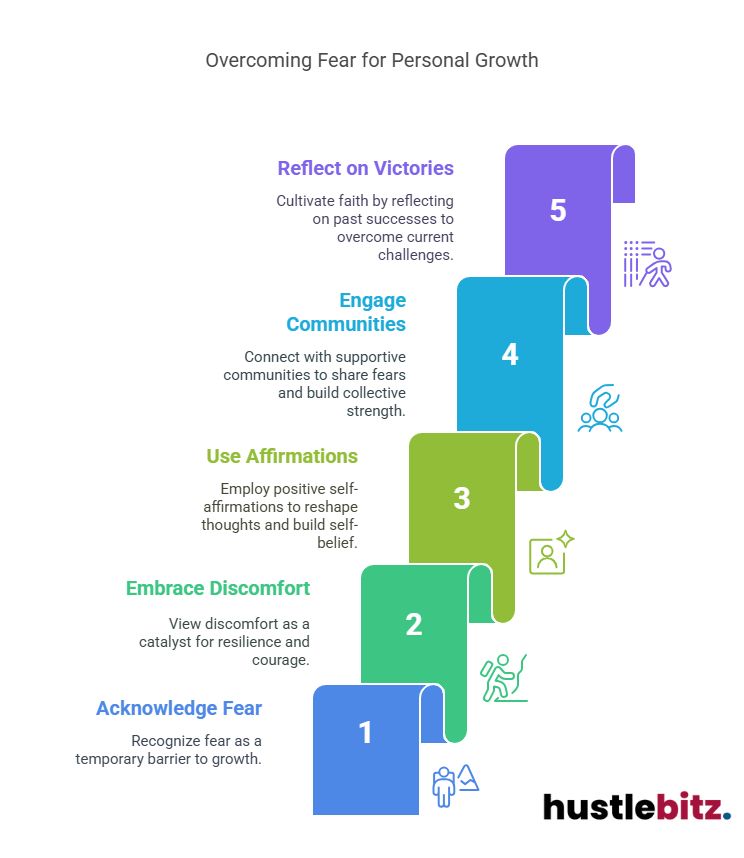Inspiration serves as a powerful tool for overcoming anxiety and doubt. Quotes like “Fear is temporary. Regret is forever” remind us of the importance of confronting our fears rather than allowing them to dictate our lives. Another impactful phrase states, “Everything you want is on the other side of fear,” emphasizing that true growth lies beyond discomfort. Embracing such wisdom fosters resilience and encourages individuals to pursue their dreams. As individuals face their fears, they often discover untapped strength and capability. There are more profound insights and uplifting phrases that can further illuminate this journey of self-discovery and empowerment.
Key Takeaways
- Acknowledge that fear is temporary; confronting it leads to personal growth and new opportunities.
- Embrace discomfort as a catalyst for resilience and courage in facing life’s challenges.
- Use positive self-affirmations to reshape thoughts and alleviate anxiety, fostering self-belief.
- Engage with supportive communities to share fears, reinforcing connections and collective strength.
- Reflect on past victories to cultivate faith in your ability to overcome current challenges.

Understanding Anxiety and Doubt
Anxiety and doubt, often intertwined, can significantly impact an individual’s mental well-being, as they create a pervasive sense of uncertainty and fear about the future. Understanding the underlying anxiety triggers is crucial for anyone seeking to navigate these challenging emotions. Common triggers include significant life changes, social situations, and personal expectations that weigh heavily on the mind. Recognizing these triggers allows individuals to confront their feelings rather than let them fester.
Effective doubt management is essential in this context. By implementing structured coping strategies, individuals can cultivate a sense of control over their thoughts and emotions. Techniques such as journaling, cognitive reframing, or engaging in supportive conversations can provide a valuable outlet for expressing and examining doubts.
Incorporating mindfulness practices into daily routines further enhances emotional resilience. Mindfulness encourages individuals to remain present, fostering an awareness that allows them to observe their anxiety without judgment. Techniques such as meditation, deep breathing exercises, and mindful walking can ground individuals, transforming moments of tension into opportunities for growth.
Ultimately, understanding anxiety and doubt is a vital step toward building emotional resilience. By actively identifying triggers, employing doubt management strategies, and embracing mindfulness, individuals can cultivate a sense of belonging and connection with themselves and others.
This journey not only alleviates the burden of anxiety but also empowers individuals to face life’s uncertainties with confidence and strength.
The Power of Words

Words possess an extraordinary ability to shape our thoughts, influence our emotions, and ultimately transform our experiences. The language we choose can have a profound impact, especially in moments of anxiety and doubt.
When we engage with motivational phrases, we create a beacon of hope that can guide us through the murky waters of fear. These phrases not only inspire resilience but also foster a sense of community, reminding us that we are not alone in our struggles.
Emotional resonance plays a critical role in this transformative journey. When we resonate with powerful expressions, we find solace and strength. They serve as reminders of our capabilities and potential, reinforcing our belief in ourselves amidst doubt.
By employing self-affirmation techniques—simple yet effective methods that encourage positive self-talk—we can reshape our internal dialogue. This shift not only alleviates anxiety but also cultivates a nurturing environment for personal growth.
Incorporating transformative expressions into our daily lives can significantly enhance our emotional well-being. Whether through journaling, meditation, or speaking affirmations aloud, these practices empower us to reclaim our narrative.
By acknowledging the power of words, we unlock the potential to rewrite our stories, replacing anxiety with confidence and doubt with determination. Ultimately, the intentional use of language allows us to forge deeper connections with ourselves and others, creating a supportive community that thrives on encouragement and understanding.
Embrace the power of words, and witness the transformation it can bring into your life.
“Fear is temporary. Regret is forever.”

The acknowledgment that ’fear is temporary; regret is forever’ serves as a poignant reminder of the importance of confronting our fears rather than allowing them to dictate our choices. In our journey toward emotional resilience, it becomes crucial to engage in effective fear management strategies that empower us to face challenges head-on.
The discomfort we experience when confronting fear is often fleeting, whereas the weight of unaddressed fears can manifest as lasting regrets.
Engaging in regret analysis allows us to reflect on past decisions influenced by fear. How many opportunities have we missed due to hesitation? Each moment spent in fear can lead to long-term consequences that shape our lives in ways we may not fully appreciate until it is too late.
By recognizing that the temporary discomfort of facing our fears is far less significant than the permanence of regret, we cultivate a mindset geared toward growth and connection.
As we share our experiences within our communities, we foster a sense of belonging, encouraging one another to embrace discomfort as a necessary step towards fulfillment. The courage to confront fear not only liberates us but also inspires those around us.
Ultimately, choosing action over inaction, despite fear, lays the groundwork for a life rich with experiences, learning, and genuine connections, allowing us to thrive rather than merely exist. In this light, we see that the path to overcoming anxiety and doubt is illuminated by the choices we make today.
“The beautiful thing about fear is, when you run to it, it runs away.”

Confronting fear directly often leads to its dissolution, revealing that the barriers we perceive are frequently less formidable than they appear. The journey of fear transformation is not merely about avoidance but about embracing discomfort. By leaning into our fears, we cultivate courage and discover that what once seemed daunting can be navigated with relative ease.
When we engage in fear exploration, we empower ourselves to manage anxiety more effectively. The act of facing our fears can manifest in various ways:
- Courage cultivation: Each time we confront a fear, we strengthen our resolve and build confidence.
- Embracing discomfort: Learning to sit with discomfort prepares us for future challenges, making the unknown feel less threatening.
- Community support: Sharing our fears with others fosters connections, reminding us that we are not alone in our struggles.
In this process, we learn that fear often diminishes in the light of action. The beautiful truth is that when we run toward our fears instead of away from them, they lose their power over us.
This shift not only aids in anxiety management but also opens the door to new opportunities and experiences. By choosing to embrace our fears, we not only transform them but also ourselves, creating a pathway to a more fulfilling life.
Ultimately, the act of running toward fear becomes a testament to our resilience and a beacon of hope for others who may be struggling.
“Everything you want is on the other side of fear. Get over it.”
Embracing the concept that everything you desire lies beyond the boundaries of fear encourages individuals to confront their anxieties head-on, recognizing that growth and fulfillment often require stepping outside of comfort zones.
Fear motivation serves as a powerful catalyst for personal growth, pushing us to face the very challenges that seem insurmountable. By acknowledging our fears, we open the door to courage development, allowing ourselves to transform trepidation into strength.
When we engage in embracing challenges, we discover that every obstacle we overcome not only diminishes our fears but also fosters a sense of belonging within ourselves and our communities. Each step taken in defiance of our apprehensions builds resilience, reinforcing the notion that we are capable of more than we ever imagined. It is in these moments of confrontation that we cultivate a deeper understanding of our potential.
The journey of overcoming obstacles is not merely about conquering fear; it is about discovering our true selves. As we push through barriers, we uncover the richness of life that awaits us on the other side. This ongoing process nurtures our spirit and enhances our relationships, as we connect with others who share similar struggles and aspirations.
Ultimately, the path to personal growth is paved with the courage to face fear. By embracing this journey, we not only achieve our desires but also inspire those around us to do the same. Together, we can create a supportive environment where everyone feels empowered to conquer their fears and embrace their potential.
“Feed your faith and your fears will starve to death.”

Nurturing one’s faith is a powerful strategy for diminishing the influence of fear in our lives. When we choose to feed our faith, we cultivate resilience that empowers us to confront life’s uncertainties. This proactive approach not only helps us overcome challenges but also fosters personal growth and an unwavering inner strength.
To effectively nurture faith and starve fear, consider the following practices:
- Embrace a positive mindset shift: Recognize that faith is not merely a passive belief but an active choice to see possibilities rather than limitations. This shift can profoundly influence how we respond to anxiety.
- Engage in supportive communities: Surrounding ourselves with individuals who share similar values can reinforce our faith. Such connections remind us that we’re not alone in our struggles, encouraging collective resilience.
- Reflect on past victories: Reminding ourselves of previous instances where we overcame fear can bolster our inner strength. Each challenge we’ve faced contributes to our narrative of growth, reinforcing the belief that we can navigate future obstacles.
“Too many of us are not living our dreams because we are living our fears.”

Many individuals find themselves trapped in a cycle of fear that hinders their ability to pursue and achieve their dreams. This cycle often stems from self-doubt, anxiety, and the overwhelming pressure of societal expectations. When we allow fear to dictate our choices, we distance ourselves from the path of dream fulfillment, leaving aspirations unfulfilled and potential untapped.
Fear management is crucial in breaking this cycle. By confronting our fears, we create opportunities for personal growth and confidence building. Embracing vulnerability allows us to recognize that obstacles are not insurmountable barriers but rather stepping stones on our journey. Each challenge we face can be a catalyst for transformation if we choose to see it that way.
Collectively, we can foster an environment that nurtures courage and resilience. When we share our fears and experiences, we create a community of support that encourages one another to overcome obstacles. This sense of belonging can empower us to take bold steps toward our dreams, reinforcing the belief that we are not alone in our struggles.
Ultimately, living a life free from the constraints of fear opens doors to limitless possibilities. By prioritizing our aspirations and advocating for ourselves, we can cultivate a mindset that embraces challenges rather than shies away from them. Let us commit to overcoming our fears, pursuing our dreams with fervor, and inspiring others to do the same.
Final Thoughts
Facing fears is a transformative journey that paves the way for personal growth and empowerment. The inspiring quotes and insights shared here remind us that overcoming anxiety and doubt is achievable. By viewing fear as a temporary obstacle, individuals can cultivate resilience and pursue their goals with renewed confidence. Engaging in practices like positive affirmations and self-reflection enhances emotional well-being while fostering self-understanding. Remember, each step taken toward confronting fear is a stride toward a more fulfilling life. Embrace your journey, recognize your strength, and let these empowering messages guide you as you transform anxiety into a catalyst for growth, reaffirming your capability to achieve your desires.




